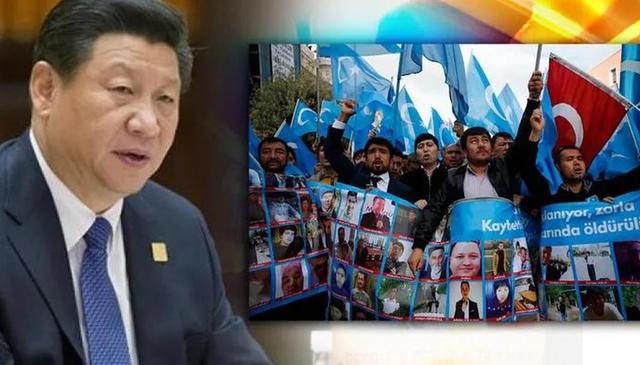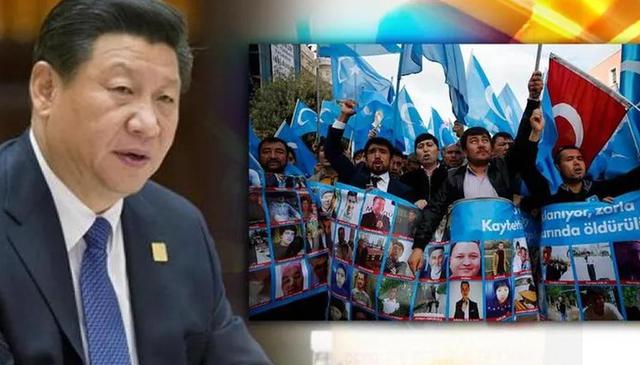UN cites possible crimes vs. humanity in China’s Xinjiang
China’s discriminatory detention of Uyghurs and other mostly Muslim ethnic groups in the western region of Xinjiang may constitute crimes against humanity, the U.N. human rights office said in a long-awaited report Wednesday, which cited “serious” rights violations and patterns of torture in recent years.

China’s discriminatory detention of Uyghurs and other mostly Muslim ethnic groups in the western region of Xinjiang may constitute crimes against humanity, the U.N. human rights office said in a long-awaited report Wednesday, which cited “serious” rights violations and patterns of torture in recent years.
The report seeks “urgent attention” from the U.N. and the world community to rights violations in Beijing’s campaign to root out terrorism.
U.N. human rights chief Michelle Bachelet, facing pressure on both sides, brushed aside multiple Chinese calls for her office to withhold the report, which follows her own, much-criticized trip to Xinjiang in May. Beijing contends the report is part of a Western campaign to smear China’s reputation.
The report has fanned a tug-of-war for diplomatic influence with the West over the rights of the region’s native Uyghurs and other ethnic groups.
The report, which Western diplomats and U.N. officials said had been all but ready for months, was published with just minutes to go in Bachelet’s four-year term. It was unexpected to break significant new ground beyond sweeping findings from researchers, advocacy groups and journalists who have documented concerns about human rights in Xinjiang for several years.
But the 48-page report comes with the imprimatur of the United Nations and its member countries – notably including rising superpower China itself. The report largely corroborates earlier reporting by advocacy groups and others and injects U.N heft behind the outrage that victims and their families have expressed about China’s policies in Xinjiang.
Beijing’s repeated denial of the human rights crisis in Xinjiang rings ever-more hollow with this further recognition of the evidence of ongoing crimes against humanity and other human rights violation in the region,” Agnes Callamard, Amnesty International’s secretary-general, said in a statement.
The run-up to the report’s release fueled a debate over China’s influence at the world body and epitomized the on-and-off diplomatic chill between Beijing and the West over human rights, among other sore spots.
China shot back, saying the U.N. rights office ignored human rights “achievements” made together by “people of all ethnic groups in Xinjiang.”
Based on the disinformation and lies fabricated by anti-China forces and out of presumption of guilt, the so-called ‘assessment’ distorts China’s laws, wantonly smears and slanders China, and interferes in China’s internal affairs,” read a letter from China’s diplomatic mission in Geneva issued in response to the U.N. report.
China released a 122-page report titled “Fight Against Terrorism and Extremism in Xinjiang: Truth and Facts” that defended its record and was distributed by the U.N. with its assessment.
The U.N. report says “serious human rights violations” have been committed in Xinjiang under China’s policies to fight terrorism and extremism, which singled out Uyghurs and other predominantly Muslim communities, between 2017 and 2019.
The report cites “patterns of torture” inside what Beijing called vocational training centers, which were part of its reputed plan to boost economic development in region, and it points to “credible” allegations of torture or ill-treatment, including cases of sexual violence.
Above all, perhaps, the report warns that the “arbitrary and discriminatory detention” of such groups in Xinjiang, through moves that stripped them of “fundamental rights … may constitute international crimes, in particular crimes against humanity.”
The report called on China to release all individuals arbitrarily detained and to clarify the whereabouts of individuals who have disappeared and whose families are seeking information about them.
The report was drawn in part from interviews with former detainees and others familiar with conditions at eight detention centers. Its authors suggest China was not always forthcoming with information, saying requests for some specific sets of information “did not receive formal response.”
The rights office said it could not confirm estimates of how many people were detained in the internment camps in Xinjiang, but added it was “reasonable to conclude that a pattern of large-scale arbitrary detention occurred” at least between 2017 and 2019.
According to investigations by researchers and journalists, the Chinese government’s mass detention campaign in Xinjiang swept an estimated million or more Uyghurs and other ethnic groups into a network of prisons and camps over the past five years.
Beijing has closed many of the camps, but hundreds of thousands continue to languish in prison on vague, secret charges.
The report said that reports of sharp increases in arrests and lengthy prison sentences in the region strongly suggested a shift toward formal incarceration as the principal means for large-scale imprisonment and deprivation of liberty – instead of the use of the “vocational training centers” once touted by Beijing.
“This is of particular concern given the vague and capacious definitions of terrorism, ‘extremism’ and public security related offenses under domestic criminal law,” the report said, saying it could lead to lengthy sentences, “including for minor offenses or for engaging in conduct protected by international human rights law.”



